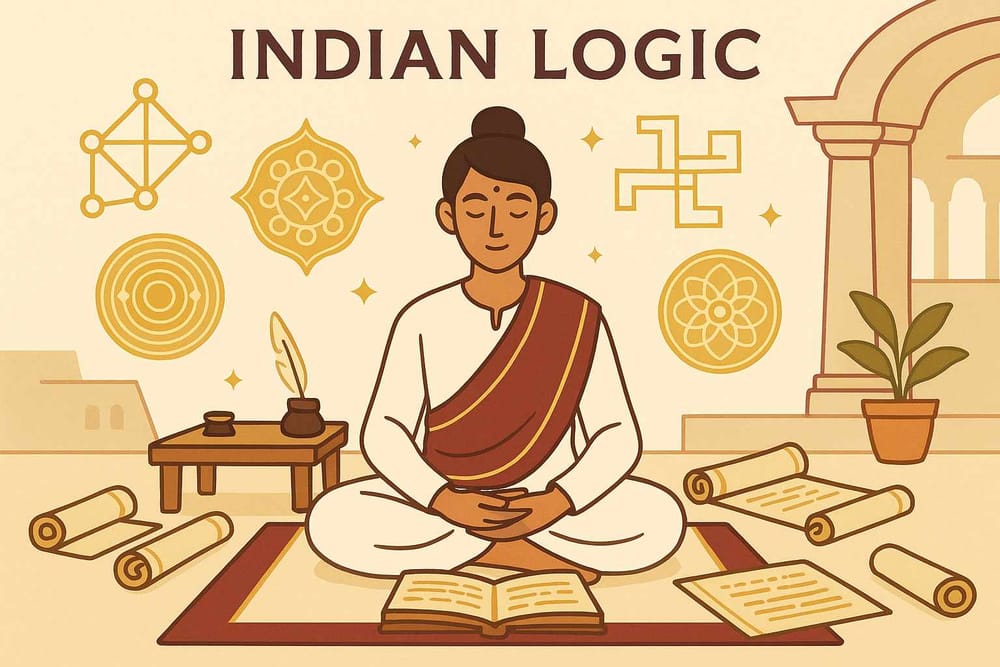
Indian Logic for UGC NET 2025: Your Key to Exam Success
Preparing for the UGC NET exam often feels like embarking on a great quest. You gather your books, chart your study plan, and then you come across a section in Paper 1: Indian Logic. For many of us, this can feel both intimidating and intriguing. It's a world filled with words like Pramana, Anumana, and Hetvabhasa. But let me tell you, this isn't just another tough topic to memorize. It’s a beautiful journey back to our roots, a chance to understand the incredible intellectual heritage our ancestors have left for us. Think of it not as a hurdle, but as a key to unlocking a sharper, more analytical mind.
More Than Just an Exam Topic: Why Our Ancient Logic Matters
In our daily lives, we are constantly reasoning, debating, and trying to understand the world. Indian Logic, or Bharatiya Tarka Shastra, is the systematic study of exactly that, but from a perspective that is deeply woven into our culture and philosophy. Unlike Western logic which can sometimes feel very rigid and mechanical, Indian Logic is connected to the pursuit of truth and right living.
At its heart are brilliant philosophical schools like:
- Nyaya Philosophy: This is the superstar of Indian Logic! The Nyaya school, founded by the great sage Gautama, gave us a powerful framework for argumentation and reasoning. It teaches us how to arrive at valid knowledge, making it incredibly relevant for the critical thinking skills tested in the UGC NET exam.
- Mimamsa Philosophy: This school focuses on the correct interpretation of sacred texts. It provides logical rules to understand the true meaning behind rituals and dharma, showing us that faith and reason have always walked hand-in-hand in our traditions.
Your Treasure Map: Key Concepts You Absolutely Must Master
To navigate this fascinating subject and score well, you need to understand a few core concepts. Don't worry about the Sanskrit terms; once you grasp the meaning, they become easy to remember. Think of these as the essential tools in your reasoning toolkit.
The Six Paths to True Knowledge: Understanding the Pramanas
One of the most frequently asked topics in the exam is about the Pramanas, or the means of valid knowledge. These are the sources we can trust to give us correct information. Focus on these six:
- Pratyaksha (Perception): This is knowledge gained directly through our senses. Seeing a flower, hearing music, tasting a sweet – it’s the most direct way of knowing.
- Anumana (Inference): This is where the real magic of logic happens! It’s the knowledge we gain by reasoning. For example, if you see smoke on a distant hill, you infer that there must be a fire. This is a crucial area, so pay close attention to its structure.
- Upamana (Comparison/Analogy): This is knowing something new by comparing it to something you already know. If someone tells you a wild cow (gavaya) looks like a domestic cow, you use comparison to identify it when you see one.
- Shabda (Verbal Testimony): This is knowledge gained from a reliable source, like the words of a trusted expert, a teacher, or sacred texts.
- Arthapatti (Implication/Postulation): This is when we assume a fact to make sense of a given situation. If a healthy person says they don't eat during the day, we can imply that they must be eating at night.
- Anupalabdhi (Non-apprehension): This is knowing about the absence of something. For instance, knowing there is no book on the table simply by not seeing one there.
Spotting the Traps: Learning About Hetvabhasa (The Fallacies)
Just as important as building a strong argument is knowing how to spot a weak one. Hetvabhasa refers to the fallacies of inference—the errors in reasoning that make an argument invalid. The UGC NET exam loves to test this! Understanding common fallacies will not only help you answer questions correctly but also make you a sharper thinker in everyday life.
Your Winning Strategy: How to Prepare for Indian Logic
Feeling a bit more confident? Great! Now let’s talk about a practical plan to turn that confidence into marks. A smart approach is far more effective than just memorizing everything.
Start with a Solid Foundation
Before you dive in, understand the battlefield. Go through the previous years' question papers to see which topics, like Pramanas and the types of Anumana, appear most often. For a deep and clear understanding, referring to good books is essential. While there are many UGC NET guides, consider reading "An Introduction to Indian Philosophy" by Chatterjee and Datta to build a strong conceptual base. A clear understanding is better than rote learning.
Make Learning Stick
The Sanskrit terms can be tricky, but you can master them. Create simple flashcards or mind maps. For instance, draw a flowchart for the five-membered syllogism of Nyaya (Panchavayava Nyaya). This visual method helps complex ideas settle in your mind much better than just reading pages of text. Repetition is key, so revise your notes regularly.
Practice is Your Best Friend
There's no substitute for practice. Regularly take mock tests that are specifically designed for UGC NET Paper 1. This will help you manage your time, understand the question patterns, and identify your weak areas. Questions on Indian Logic can sometimes be conceptual and tricky, but with enough practice, you'll start to see the patterns and tackle them with ease.
Navigating the Journey with a Calm Mind
Intense preparation requires immense focus and mental clarity. It's easy to feel overwhelmed by the vast syllabus. It is in these moments that the wisdom of our traditions can help. Just as a clear mind is essential for spiritual pursuits, like those one might explore on a peaceful spiritual retreat, it is equally vital for cracking complex subjects like Nyaya. Ensure you take regular breaks, meditate, and keep a positive mindset.
Connecting with Our Roots Through Knowledge
Studying Indian Logic for an exam is a great goal, but it's also an opportunity to connect with a profound intellectual tradition that has shaped our culture for centuries. It's a journey into the heart of Indian philosophy.
At Bhaktilipi, we believe in making this timeless wisdom accessible to everyone. Our platform is a space where you can explore the inspiring stories and philosophical gems that form the bedrock of our culture. While you prepare for your exam, let Bhaktilipi be your companion in exploring the spiritual and devotional literature that enriches the mind and soul. You can join our community and deepen your connection with our heritage.
Stay connected with us for more valuable insights:
A Final Word of Encouragement
Mastering Indian Logic is not just about passing an exam; it’s about training your mind to think with clarity, precision, and depth. Embrace this part of your preparation with curiosity and respect. Be consistent, practice diligently, and trust in your ability to understand these profound concepts.
Remember, this journey of learning is a reward in itself. We wish you all the very best for your UGC NET 2025 preparation. May you succeed with flying colours!
A passionate group of people dedicated to preserving India's knowledge of Dharma, Karma, and Bhakti for ourselves and the world 🙏.
Comments
Related in

Indian Logic for UGC NET 2025 - Secrets You Need Now
The journey to crack a competitive exam like the UGC NET can sometimes feel like a long, winding road. We gather books, make notes, and spend countless hours studying. But every now and then, we come across a topic that isn’t just about marks; it’s a doorway into
